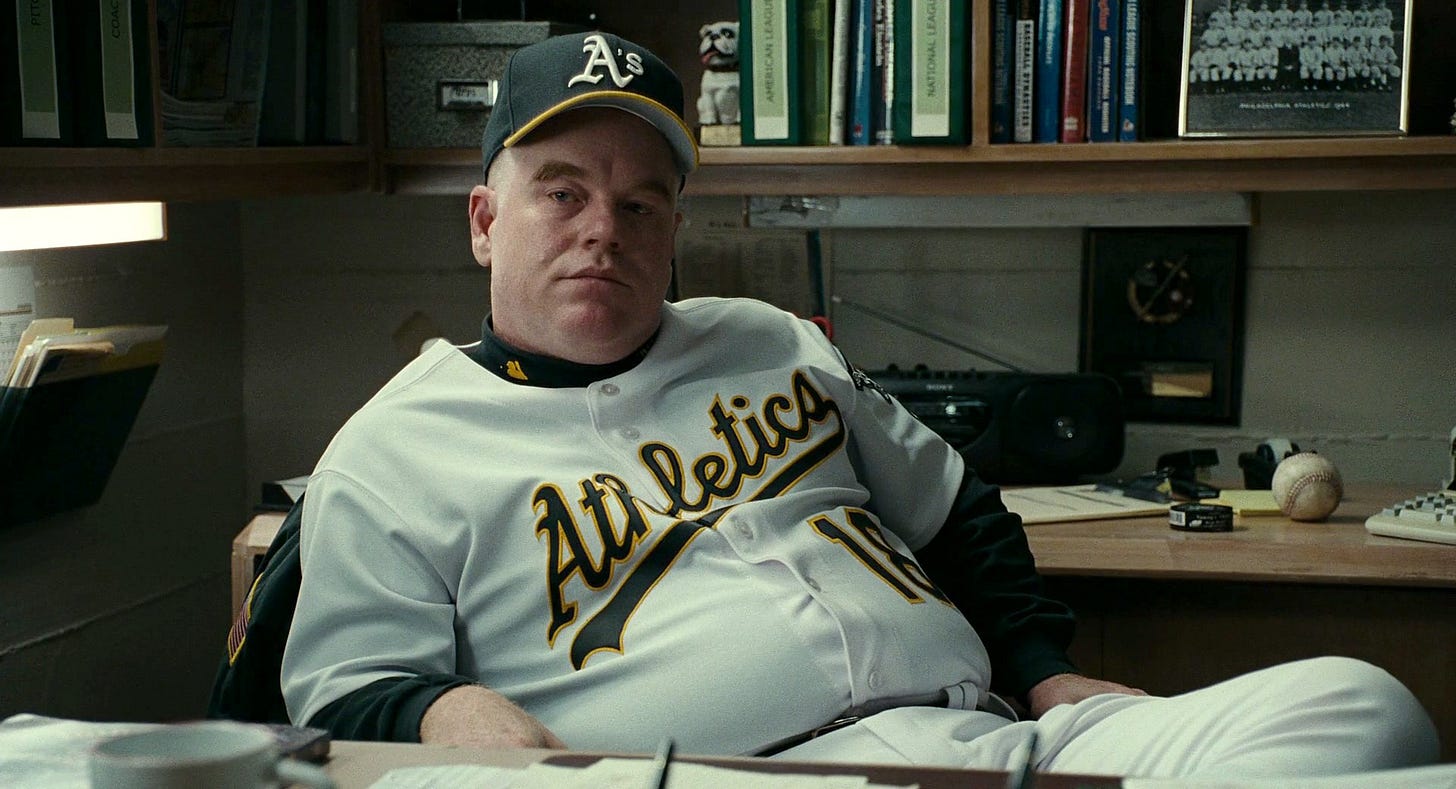Moneyball (2011) and a final farewell to Philip Seymour Hoffman (part 7)
“It’s hard not to be romantic about baseball”

The seventh and final instalment in my retrospective series of posthumous appreciation for the much missed screen presence of Philip Seymour Hoffman ironically finds him in his smallest role in this 7th inning stretch but hey, “It’s hard not to be romantic about baseball” and I remain a contrarian until the end.
“Art Howe” (Philip Seymour Hoffman) Bald, rotund, disaffected and furious that his efforts last season in curating a winning team has only ensured a one year contract, Philip plays Oakland A’s manager Art Howe with a distanced disinterested and especially with anything and everything connected to the “moneyball” system of baseball management now thrust upon him. Largely missing from the first Act until a brief appearance ushers in his main presence into Act Two, here he shines as a manager firstly kept in the dark as to the ground rule doubles under which he has to work and after having the heart and soul of his previously winning team sold to the Boston Red Sox and the New York Yankees, now he sees future all-stars traded mid-season from a team he’s determined to play in a traditional baseball way rather than the sideline diktats of a general manager who doesn’t even watch his team play and a “Google Boy” economics graduate from Yale who values statistics over the players he watches and coaches every day of the year.
Even for a 50 something limey like me it is rather difficult not to be romantic about baseball. The glorious sound and crack off the bat as a no-doubter sails into the night sky and into the right-field bleachers for a Home Run (HR), the splintered bat and hurry to first base for a scampered single or hit (H), the line drive that scores a runner hurtling around the bases for a Run Batted In (RBI) and most importantly of all, that, and a balanced budget of trying to compete with the mega-spending Sox of Boston, the Evil Empire in New York and latterly, my own team of heroes in the Dodger blue of Los Angeles, is the statistic that drives Moneyball here and perhaps still does, OBP or On Base Percentage. Put simply, whether you get hit by a pitch, bunt, walk, bloop a single from a broken bat or crush a triple into the deepest corner of left-field, you have to get on base. By doing so, your percentage chance of scoring a run for the team increases significantly and naturally, scoring runs is the name of the game, and baseball is all about scoring more runs than your opposition.
The whole concept of Moneyball is far more complicated than simply increasing your team’s OBP but that’s where even the romantic who adopted the game from its very first airing here in the UK in the 1980’s tunes out for the far easier to digest romanticism of the memories of watching my first favourite player Jose Canseco (ironically, then a slugger for the Oakland A’s) crush baseballs into the night sky for fun or Bill Murray singing “Take Me Out To The Ball Game” at Chicago’s Wrigley Field, the grand history of Fenway Park in Boston, my next favourite player Eric Gagne slaying all before him with a fastball no-one could hit, to my heroes in Dodger blue winning two World Series titles in recent memory and my desire to one day sit in the cheap seats in centre-field at Dodger Stadium, the sun on my face, a face full of contented sporting bliss.
Directed by Bennett Miller, he of the highly acclaimed and highly recommended Capote (2005) and Foxcatcher (2014), Moneyball garnered 6 Academy Award nominations in 2011 and although coming up empty in every category, this is Brad Pitt’s film and vehicle to shine in his portrayal of real life ex player and then general manager of the Oakland A’s, Billy Beane. Oscar win or not (Jean Dujardin won for The Artist in Pitt’s category of Best Actor that year) Pitt is superb in his portrayal of duality and a man who steadfastly refuses to watch the games but is glued to them on the radio, a distant and somewhat aloof figure yet attentive to his daughter and even as a man flying by the seat of his baseball pants and yet, to everyone around him, he has everything, everyone and even the Moneyball system, under control. Pitt portrays a young buck butting heads with baseball dinosaurs (Seymour-Hoffman as Art Howe is included here too), determined to drag not only the team but the whole Oakland A’s franchise away from “medieval thinking”, turn a half-full Coliseum stadium into a full one, not only balance a meagre budget but turn it on its head against his vastly superior and big spending rivals and of course, win the American League pennant before doing likewise in “The Show” at the yearly October dance of the World Series.
Thus my Philip Seymour-Hoffman odyssey is over. Rest well sweet man. I miss you. Moneyball is as highly recommended as Bennett Miller’s other two feature length releases and with Capote recently given the Blackford Film Club treatment, I guess I better go to the mat next with Foxcatcher.
“Take me out to the ball game
Take me out with the crowd
Buy me some peanuts and cracker jack
I don’t care if I never get back
Let me root, root, root for the Dodgers
If they don’t win it’s a shame
For it’s one, two, three strikes, you’re out
At the old ball game!”
Thanks for reading. I hope this message in a bottle in The Matrix finds you well, prospering, and the right way up in an upside down world.
Whilst you’re here I may as well brag about the release of my trilogy of recently self-published books. Beautiful covers eh! As the title(s) would suggest, this is my life at the movies or at least from 1980 to 2024, and in volume 1 you’ll find 80 spoiler free appraisals of movies from debut filmmakers, 91 of the very best films appraised with love and absent of spoilers from 1990–2024 in volume 2, and in volume 3 you’ll find career “specials” on Paul Thomas Anderson and Quentin Tarantino together with the very best of the rest and another 87 spoiler free film reviews from 2001–2024.
All available in hardback and paperback and here are some handy links:
"A Life at the Movies Vol.1" - link to Amazon
"A Life at the Movies Vol.2" - link to Amazon
"A Life at the Movies Vol.3" - link to Amazon






I gotta say that Hoffman is so great in this, so funny, so understated, his pained expressions saying more than twenty five Brad Pitt monologues.
But... I really do enjoy this movie, but it's not entirely connected to the truth of those Oakland A's teams. Hoffman is NOTHING like Art Howe. Presumably on purpose, of course -- Howe was a skinny, severe man with a long and reputable resume who supposedly got along with Billy Beane. But it's part of the movie's mission (and, technically, Hoffman's) to make Howe look like an incompetent bystander who pushed back against sabermetrics, when that really wasn't true. That being said, "Moneyball" is a baseball movie that doesn't even mention the best players on the team, so the Howe character assassination is hardly the film's most flagrant abuse of the truth.
Fromtheyardtothearthouse.substack.com